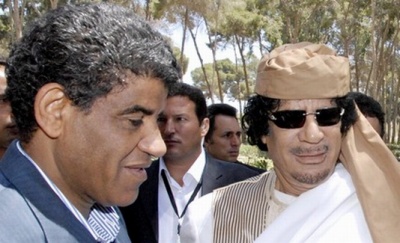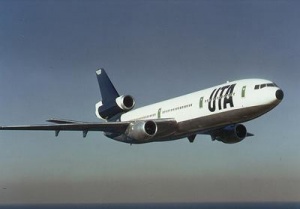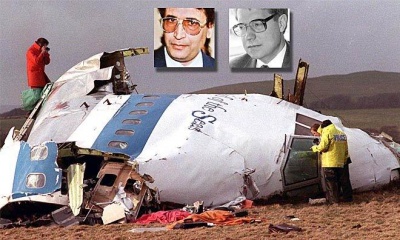Difference between revisions of "Abdullah al-Senussi"
(te) |
(Death penalty imposed) |
||
| Line 18: | Line 18: | ||
:"Mr Al-Senussi has been held incommunicado without access to legal advice in respect of any proceedings. I am certain that you would wish any interview to be conducted between Mr Al-Senussi and Scottish police officers to be scrupulously fair, putting its admissibility in subsequent proceedings beyond any doubt."<ref>[http://www.thetimes.co.uk/tto/news/uk/scotland/article3252942.ece "Scots police to question Gaddafi henchman"]</ref> | :"Mr Al-Senussi has been held incommunicado without access to legal advice in respect of any proceedings. I am certain that you would wish any interview to be conducted between Mr Al-Senussi and Scottish police officers to be scrupulously fair, putting its admissibility in subsequent proceedings beyond any doubt."<ref>[http://www.thetimes.co.uk/tto/news/uk/scotland/article3252942.ece "Scots police to question Gaddafi henchman"]</ref> | ||
| − | + | On 28 July 2015, the [[BBC]]'s John Simpson reported that a Libyan court had imposed the death sentence on [[Saif al-Islam Gaddafi]] and eight others including former head of intelligence Abdullah al-Senussi and former prime minister [https://vivalibya.wordpress.com/2015/05/21/dr-baghdadi-al-mahmoudi-speaks-in-daesh-court-may-20/ Baghdadi al-Mahmoudi].<ref>[http://www.bbc.co.uk/news/world-africa-33688391 "Libya trial: Gaddafi son sentenced to death over war crimes"]</ref> | |
==Biography== | ==Biography== | ||
Revision as of 11:34, 28 July 2015
 Abdullah al-Senussi, formerly Libya’s intelligence chief and right-hand man of Muammar Gaddafi | |
Abdullah al-Senussi (born 5 December 1949) is a Libyan national who was the intelligence chief and distant relative of Colonel Muammar Gaddafi, having married Gaddafi's sister-in-law.[1] Abdullah al-Senussi is of interest to authorities in Europe and the United States since many believe his privileged position in Gaddafi's authoritarian regime means he could have information about atrocities including the bombing of Pan Am Flight 103 over the Scottish town of Lockerbie in 1988. In Libya, al-Senussi is best known for his alleged role in the killing of more than 1,200 inmates at Tripoli's Abu Salim prison in 1996. He was also involved in the controversial rapprochement between Gaddafi's government and Britain and France in the early 2000s, which led to growing commercial ties.
During the 2011 NATO bombing of Libya in support of the rebels, Abdullah al-Senussi was indicted by the International Criminal Court (ICC) and accused of war crimes allegedly committed during the uprising against Muammar Gaddafi. On 16 May 2011, the ICC prosecutor Luis Moreno-Ocampo announced that he was seeking an arrest warrant for Abdullah al-Senussi on charges of crimes against humanity.[2] He was reported to have been captured on several occasions but it was not until 5 September 2012 however that Mauritania, where he had taken refuge and been arrested, actually extradited al-Senussi to Libya. The new Libyan authorities were said to have paid Mauritania $200 million to hand him over in defiance of the ICC's arrest warrant, and undertook to put him on trial in Libya for crimes allegedly committed during the time he was Gaddafi's assistant.[3]
In October 2013, the BBC reported that the International Criminal Court had ruled that al-Senussi can be tried in Libya on the basis that "Libya is willing and able genuinely to carry out" investigations into Mr Senussi. Although Senussi's lawyers were appealing the ICC ruling, he appeared in a court in Libya for a pre-trial hearing on 19 September 2013.[4]
On 11 December 2013, his daughter Anoud al-Senussi said he should be brought to The Hague to face trial, warning that her father faced a show trial and death in Libya unless extradited. She said her father was being denied access to lawyers in his prison in Libya, where has been held since he was extradited from Mauritania. Anoud al-Senussi told Reuters she did not expect her father to be freed, but that she was hoping to secure for him a fair trial before "a fair court". A month earlier, Senussi's lawyer Ben Emmerson QC said:
- "He should be tried at the ICC, where he will not face the death penalty."
Pointing to the kidnapping by militias earlier this year of the new prime minister Ali Zeidan, they say that, two years on from the uprising, Libya is still too unstable to give a fair trial to a figure as prominent as Abdullah al-Senussi.[5]
In February 2014, it was reported that Scottish police officers are planning to interview al-Senussi in connection with the Lockerbie bombing, raising the prospect of a second Lockerbie trial. His British lawyer, Ben Emmerson QC, has called on Scottish police not to interview him as part of a new Lockerbie bombing inquiry without a lawyer being present:
- "Mr Al-Senussi has been held incommunicado without access to legal advice in respect of any proceedings. I am certain that you would wish any interview to be conducted between Mr Al-Senussi and Scottish police officers to be scrupulously fair, putting its admissibility in subsequent proceedings beyond any doubt."[6]
On 28 July 2015, the BBC's John Simpson reported that a Libyan court had imposed the death sentence on Saif al-Islam Gaddafi and eight others including former head of intelligence Abdullah al-Senussi and former prime minister Baghdadi al-Mahmoudi.[7]
Contents
Biography
According to The Guardian, Abdullah al-Senussi had a reputation for brutality since the 1970s. During the 1980s he was head of internal security in Libya, at a time when many opponents of Gaddafi were killed. Later, he had been described as the head of military intelligence, but it is unclear whether he actually held an official rank. In 1999 he was convicted in absentia in France for his role in a 1989 bombing of a passenger plane flying over Niger that resulted in the death of 170 people. He is alleged to have been responsible for massacring 1,200 prisoners at the Abu Salim jail in 1996. He was also thought to have been behind an alleged plot in 2003 to assassinate Crown Prince Abdullah of Saudi Arabia. It was Senussi’s marriage to Muammar Gaddafi’s wife’s sister in the 1970s that saw him enter the elite circle of Libya’s leader and assume various roles including deputy chief of the External Security Organisation (ESO).[8]
WikiLeaks cables described him as being a confidant of Gaddafi who makes "many of his medical arrangements". During the NATO attack on Libya, al-Senussi was blamed for orchestrating killings in the city of Benghazi and recruiting foreign mercenaries. He was believed to have extensive business interests in Libya.
On 1 March 2011, Libya's Quryna newspaper reported that Gaddafi had sacked him.[9]
On 21 July 2011, Libyan opposition sources claimed that Senussi had been killed in an attack by armed rebels in Tripoli; however, a few hours later the same sources recanted on their earlier claim and some even said he might have just been injured.[10]
On 30 August 2011, there were reports that both Senussi's son, Mohammed Abdullah al-Senussi,[11] and Muammar Gaddafi's son, Khamis, were killed during clashes with NATO and NTC forces in Tarhuna.[12] In October, Arrai TV, a pro-Gaddafi network in Syria, confirmed that Mohammed Senussi and Khamis Gaddafi had been killed on 29 August.[13] On 20 October, Niger foreign minister Mohammad Bazoum told Reuters that he had fled to Niger.[14] However, a Libyan fighter later told The Guardian that the rebels had possession of three other men who were in Gaddafi's convoy when he was killed and that he believed one them was Senussi.[15] The other two were identified as Gaddafi's slain son Mutassim and one of his military commanders Mansour Dhao, who was still alive and confirmed his identity, as well as details of Gaddafi's death, to Human Rights Watch while in the hospital. Dhao was earlier thought to have fled to Niger.
However, later reports surfaced that Senussi from his hideout in Niger was helping Saif al-Islam Gaddafi escape from Libya.[16] Senussi was reportedly captured on 20 November near the city of Sabha. It was afterwards reported that he would be taken to Tripoli to stand trial for charges of crimes against humanity, according to the National Transitional Council.[17] However, ICC chief prosecutor Luis Moreno Ocampo doubted Senussi was captured.[18] Libyan defence minister Osama al-Juwaily also stated that there was no evidence Senussi had been captured.[19] On 4 December 2011, Abdullah Nakir, a Libyan official, told Al Arabiya that al-Senussi was arrested and was being questioned about a secret nuclear facility Gaddafi was operating, but admitted that the Libyan government was unable to produce any photographs of him in custody.[20]
On 17 March 2012, news reports stated that Senussi had been arrested at Nouakchott airport in Mauritania.[21][22] The Libyan government is reported as having requested his extradition to Libya.[23]
In September 2012, Lebanese foreign minister Adnan Mansour and a Lebanese judge questioned him on the fate of Imam Musa Sadr.[24] On 5 September 2012, Mauritania extradited Senussi to Libyan authorities. Senussi is to be tried in Libya for crimes he allegedly committed during the time he was the close assistant to Gaddafi.[25]
Lockerbie bombing
The British lawyer for Libya's former intelligence chief, Abdullah al-Senussi, has called on Scottish police not to interview him as part of a new Lockerbie bombing inquiry without a lawyer being present.
Scottish detectives are due to interview Senussi, once the right-hand man of Muammar Gaddafi, hoping he can provide details of the bombing that killed 270 people in December 1988.
Last month Scotland's Lord Advocate, Frank Mulholland QC, visited Tripoli to arrange details of the visit after Libya dropped earlier objections.
But Ben Emmerson QC, appointed to represent Senussi by the international criminal court (ICC), said Libya has so far refused him permission to visit his client.
In a letter to Mulholland, Emmerson said detectives are in danger of breaking Scottish precedent if Senussi, a potential Lockerbie suspect, is interviewed in his Tripoli jail cell without a lawyer. He wrote:
- "Mr Al-Senussi has been held incommunicado without access to legal advice in respect of any proceedings. I am certain that you would wish any interview to be conducted between Mr Al-Senussi and Scottish police officers to be scrupulously fair, putting its admissibility in subsequent proceedings beyond any doubt."
Scottish police are hoping Senussi, Gaddafi's spy chief for most of the dictator's 42-year-rule, can answer questions about the bombing of Pan Am Flight 103 that have eluded investigators for quarter of a century.
A senior member of Emerson's legal team, Amal Alamuddin, said: "Any new inquiry into the events surrounding Lockerbie needs to be scrupulously fair, and this needs to start with Mr Senussi being given legal counsel during any interview with Scottish law officers."
Abdelbaset al-Megrahi, the only man convicted of the bombing, died in 2012 in Libya protesting his innocence.
Libya has appointed two officers to work with Scottish and American Lockerbie investigators, with the justice minister, Salah al-Marghani, saying:
- "We should know everything about what happened."
Senussi, indicted by the Hague for crimes against humanity, was captured in Mauritania after fleeing Libya after the 2011 Arab spring revolution. He was extradited to Libya and last year went on trial, amid tight security, accused of crimes committed during the revolution.
Emmerson, who represented the Wikileaks founder, Julian Assange, is also appealing against the ICC's decision in October that Libya could take the Senussi case, arguing that the country's turmoil raises doubts about its ability to hold a fair trial.[26]
UTA Flight 772

On 19 September 1989, UTA Flight 772 was sabotaged over the West African state of Niger. The investigators into the sabotage obtained a confession from one of the alleged terrorists, a Congolese opposition figure, who had helped recruit a fellow dissident to smuggle the bomb onto the aircraft.[27] This confession led to charges being brought against six Libyans. French Juge Jean-Louis Bruguière identified them, as follows:
- Abdullah al-Senussi, brother-in-law of Muammar Gaddafi, and deputy head of Libyan intelligence;
- Abdullah Elazragh, Counsellor at the Libyan embassy in Brazzaville;
- Ibrahim Naeli and Arbas Musbah, explosives experts in the Libyan secret service;
- Issa Shibani, the secret agent who purchased the timer that allegedly triggered the bomb; and,
- Abdelsalam Hammouda, Senussi's right-hand man, who was said to have coordinated the attack.
In 1999, the six Libyans were put on trial in the Paris Assize Court for the bombing of UTA Flight 772. Because Muammar Gaddafi would not allow their extradition to France, the six were tried in absentia and were convicted.
Alleged motive
The motive usually attributed to Libya for the UTA Flight 772 bombing is that of revenge against the French for supporting Chad against the expansionist projects of Libya toward Chad. Libya was understood to have considered this French support as "neo-colonialist".[28]
The Chadian–Libyan conflict (1978–1987) ended in disaster for Libya following the defeat at the Battle of Maaten al-Sarra in the 1987 Toyota War. Muammar Gaddafi was forced to accede to a ceasefire ending his dreams of African and Arab dominance. Gaddafi blamed the defeat on French and U.S. "aggression against Libya".[29]
Related Document
| Title | Type | Publication date | Author(s) | Description |
|---|---|---|---|---|
| Document:Call for US to give update on fourth Lockerbie suspect | Article | 18 December 2022 | Kathleen Nutt | Former Justice Secretary Kenny MacAskill: "Britain and America know everything. I want the UK and US to be more open. Libya have offered up Abu Agila Masud. But Masud is smaller beer. The Lord Advocate should find out what progress is being made on bringing Abdullah Senussi to court." |
References
- ↑ "Gaddafi's confidant is Abdullah Senussi, a brutal right-hand man"
- ↑ "ICC prosecutor seeks arrest warrant for Gaddafi"
- ↑ "Abdullah Al Senussi, Intelligence Chief For Former Libyan Leader Muammar Gaddafi, Arrested In Mauritania"
- ↑ "Gaddafi spy chief Abdullah al-Senussi in court"
- ↑ "Daughter of Libya's former spy chief calls for him to be tried in The Hague"
- ↑ "Scots police to question Gaddafi henchman"
- ↑ "Libya trial: Gaddafi son sentenced to death over war crimes"
- ↑ "Profile Abdullah al-Senussi"
- ↑ "Libya uprising - Tuesday 1 March as it happened: part 2"
- ↑ "Updates, Libya February 17th"
- ↑ "Libya conflict: Bani Walid siege talks 'have failed'"
- ↑ "Is Gaddafi's Son Actually Dead?(International Business Times)
- ↑ "TV station mourns death of Gaddafi's son Khamis in Libya"
- ↑ "Gaddafi spy chief believed to be hiding in Niger"
- ↑ "Gaddafi's last words as he begged for mercy: 'What did I do to you?'"
- ↑ "Gaddafi son preparing to flee Libya: NTC official"
- ↑ "Gadhafi intelligence chief captured, Libya official says"
- ↑ "Doubts by ICC chief prosecutor Luis Moreno Ocampo"
- ↑ "Libya defence minister disputes Abdullah al-Senussi capture claims"
- ↑ "Al-Senussi, Libya’s ‘Black Box’, being questioned about suspected nuclear site"
- ↑ "Gaddafi spy chief Abdullah al-Senussi held in Mauritania"
- ↑ "Muammar Gaddafi's spy chief Senussi 'arrested in Mauritania'"
- ↑ "Libya demands handover of Gaddafi spy chief Senussi"
- ↑ "Mansour, Lebanese judge to question Sanousi on Sadr’s fate"
- ↑ "Mauritania 'extradites Libya ex-spy chief Abdullah al-Senussi'"
- ↑ "Lockerbie bombing inquiry: lawyer warns police over al-Senussi interview"
- ↑ Les preuves trafiquées du terrorisme libyen by Pierre Péan (Le Monde diplomatique)
- ↑ "The French military role in Chad"
- ↑ "Disputes Raiders of the Armed Toyotas"
